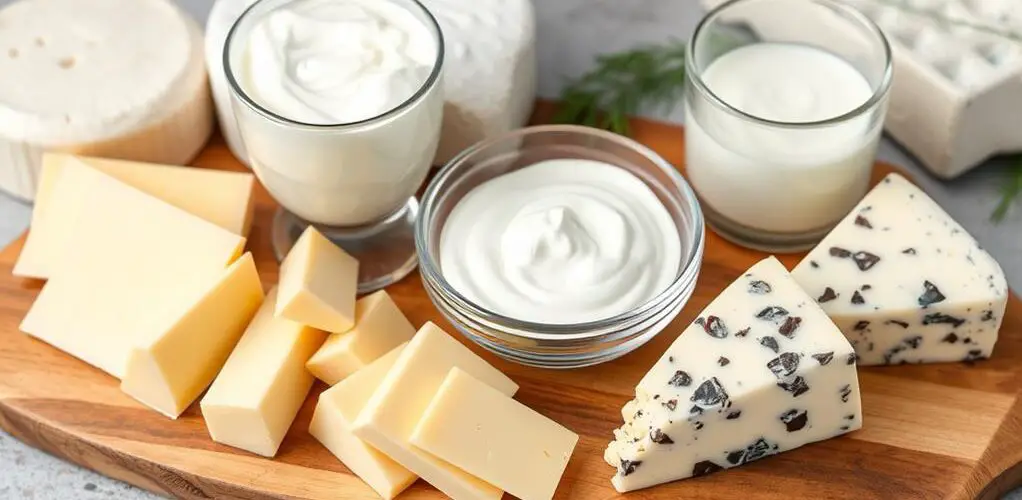
If you're on a keto diet, knowing which dairy products to enjoy is key! You can savor butter, hard cheeses like Parmesan, and creamy delights like whipping cream. Even rich, soft cheeses like Brie are great. Just be careful to avoid high-sugar dairy products such as ice cream and sweetened yogurts. Watch out for flavored milks hiding extra carbs, and steer clear of sugary puddings. Plain Greek yogurt is okay in moderation, but regular milk will throw you off ketosis. Intrigued by how to balance your dairy delights while staying keto? Well, there's plenty more to unpack!
Key Takeaways
- Butter: Zero carbs and high fat, perfect for cooking and coffee.
- Hard Cheeses: Low in carbs (1-3g per ounce), like Parmesan and Swiss.
- Whipping Cream: Less than 4g carbs per cup, ideal for desserts and sauces.
- Plain Greek Yogurt: 3-4g net carbs per serving, good in moderation.
- Soft Cheeses: Low-carb options like Brie and mascarpone for enhanced flavor.
Best Dairy for Keto
When starting on a ketogenic diet, choosing the right dairy products is essential to maintaining low carbohydrate intake while maximizing fat consumption.
Butter stands out as a fantastic option, boasting zero carbs and about 11 grams of fat per tablespoon. This makes it a high-fat staple that fits perfectly into any keto meal plan. You can spread it, cook with it, or even add it to your coffee for a creamy boost.
Keto cheese lovers rejoice: hard cheeses like Parmesan and Swiss are your best friends. They're low in carbs, usually between 1 to 3 grams per ounce, and pack a punch of protein and calcium. These cheeses make a great snack or addition to any meal.
For those who enjoy a richer touch, whipping cream is another keto-friendly choice. With less than 4 grams of carbs per cup and over 43 grams of fat, it's ideal for coffee, desserts, or making creamy sauces.
If you crave something a bit lighter, plain Greek yogurt can be included in moderation. It offers about 3 to 4 grams of net carbs per serving and is a good protein source.
Lastly, soft cheeses such as Brie and mascarpone are low in carbs and perfect for adding flavor and richness.
Dairy to Avoid
When you're sticking to a keto diet, it's important to know which dairy products to avoid.
Ice cream, flavored milks, and sweetened yogurts can have high levels of sugar and carbs, throwing you out of ketosis faster than a kid in a candy store.
Even some soft cheeses with higher lactose levels can sneak in extra carbs, so it's best to be cautious.
High-Sugar Dairy Products
Why should high-sugar dairy products be avoided on a keto diet? Simply put, they can kick you out of ketosis. Foods like ice cream, flavored milks, sweetened yogurts, and sugary puddings are packed with carbs. For example, a serving of ice cream can have over 20 grams of carbs! That's a keto no-no.
Instead, consider sugar alternatives and low carb options. Flavored milks, such as chocolate milk, often contain added sugars, making them a poor choice for keto. With about 25 grams of carbs per cup, it's a sugar bomb waiting to happen.
Sweetened yogurts are another culprit, often containing up to 40 grams of carbs per serving. That's a lot of sugar! It's better to go for plain, unsweetened yogurt and add your own low-carb toppings.
Don't forget about sugary puddings, which can have around 15-30 grams of carbs per serving. That's just too much sugar for a keto diet.
Even some soft cheeses might sneak in higher lactose levels, so always check labels.
Lactose-Rich Dairy Options
Lactose-rich dairy options pose a significant challenge for those adhering to a keto diet due to their high carbohydrate content. Cow's milk, for instance, has about 12.7 grams of carbs per cup, mostly from lactose. If you're trying to stay in ketosis, that's a lot!
Flavored milks and ice creams are even worse, sometimes packing up to 40 grams of carbs per serving because of added sugars. Sweetened condensed milk? Forget it! It's a carbohydrate bomb with around 165 grams of net carbs per cup.
Even goat's milk, often thought of as a healthier option, contains about 11 grams of carbs per cup, which is similar to cow's milk. So, it's not a good fit for strict keto followers either.
Then there are dairy alternatives like oat milk and rice milk. While they might sound like a smart switch, they can have 17 grams and 21 grams of net carbs per cup, respectively. These high-carb counts make them unsuitable for a keto diet.
For those with lactose intolerance or keto concerns, it's best to look for lower-carb dairy alternatives. Options like unsweetened almond milk or coconut milk can be much better choices.
Pros of Dairy
Have you ever wondered why dairy products are often recommended on a keto diet? One big reason is their nutrient density. Dairy products are packed with essential nutrients like calcium, phosphorus, and vitamin D, all of which are vital for keeping your bones strong and your hormones balanced.
Imagine biting into a rich, creamy piece of cheese and not only enjoying its delicious taste but also knowing it's good for you!
Another great thing about dairy is its flavor variety. From sharp cheddar to creamy brie, and even tangy yogurt, the options are endless. This variety makes your keto meals more exciting and helps you stick to your diet without feeling deprived.
Plus, the high-fat content in dairy helps you feel full for longer, reducing the urge to snack constantly.
High-fat dairy products like cheese and butter are also rich in conjugated linoleic acid (CLA), which can help with fat loss and improve heart health.
And let's not forget fermented dairy products like yogurt, which contain good bacteria that promote gut health and better digestion.
Cons of Dairy
While dairy can be a tasty part of the keto diet, it does come with some potential downsides.
High-lactose products like milk can spike blood sugar, making it harder to stay in ketosis, and may even cause digestive problems like bloating for those who are lactose intolerant.
Plus, eating too much dairy can lead to overeating and stall weight loss, so it's important to keep an eye on how much you consume.
Lactose and Ketosis Disruption
High-lactose dairy products, including milk and sweetened yogurts, pose a significant challenge for those on a ketogenic diet due to their potential to raise blood sugar and insulin levels, thereby disrupting ketosis.
When you consume these high-lactose foods, the lactose, which is a type of sugar, can quickly boost your blood sugar. For example, just one cup of whole cow's milk contains around 12.7 grams of carbs, mostly from lactose. That's a lot of sugar that can kick you out of ketosis!
For those with lactose intolerance, the situation can get even trickier. Consuming high-lactose dairy can lead to uncomfortable gastrointestinal issues, like bloating and diarrhea. This makes sticking to a keto diet even harder.
Plus, some people find that dairy makes them crave more food or leads to overeating, which can totally derail weight loss efforts.
Another issue is that eating dairy can increase levels of insulin-like growth factor 1 (IGF-1), which might make acne worse for some people.
Digestive Issues Risk
As we further explore the implications of dairy consumption within a ketogenic diet, it is essential to evaluate the potential digestive issues that can arise. Many people around the world, up to two-thirds of the population, suffer from lactose intolerance symptoms like bloating, gas, and diarrhea. Consuming dairy can disrupt your digestive health, especially if you have trouble breaking down lactose.
Here's a quick look at some common digestive issues related to dairy:
| Issue | Symptoms | Digestive Health Tips |
|---|---|---|
| Lactose Intolerance | Bloating, gas, diarrhea | Choose lactose-free options |
| High Lactose Products | Disrupted ketosis, cravings | Opt for low-lactose cheeses |
| Overeating Cravings | Weight stalls | Practice portion control |
| Skin Issues | Acne | Monitor dairy intake |
High-lactose dairy products like milk and sweetened yogurts can even disrupt ketosis, making your keto journey bumpier. Some find that after eating dairy, they crave more food, which can lead to overeating. This is a no-no for weight loss. Plus, dairy might mess with your skin, causing acne for some.
Overconsumption Concerns
Despite the benefits of dairy within a ketogenic diet, overconsumption poses significant risks that must be carefully managed. Eating too much dairy can lead to extra carbs sneaking into your diet, which might kick you out of ketosis. This is a big deal because staying in ketosis is key for losing weight on keto.
Milk and sweetened yogurts have a lot of lactose, which can spike your blood sugar and insulin levels. This makes it hard for your body to stay in ketosis. Plus, some people find that eating dairy makes them crave more food. This can lead to overeating and, you guessed it, weight gain!
Another issue is that too much dairy can add a lot of calories and carbs, which might cause a weight loss stall. If you're trying hard to shed pounds, this can be super frustrating.
And if you have skin problems like acne, dairy might make it worse because of something called insulin-like growth factor 1 (IGF-1).
Keto-Friendly Brands
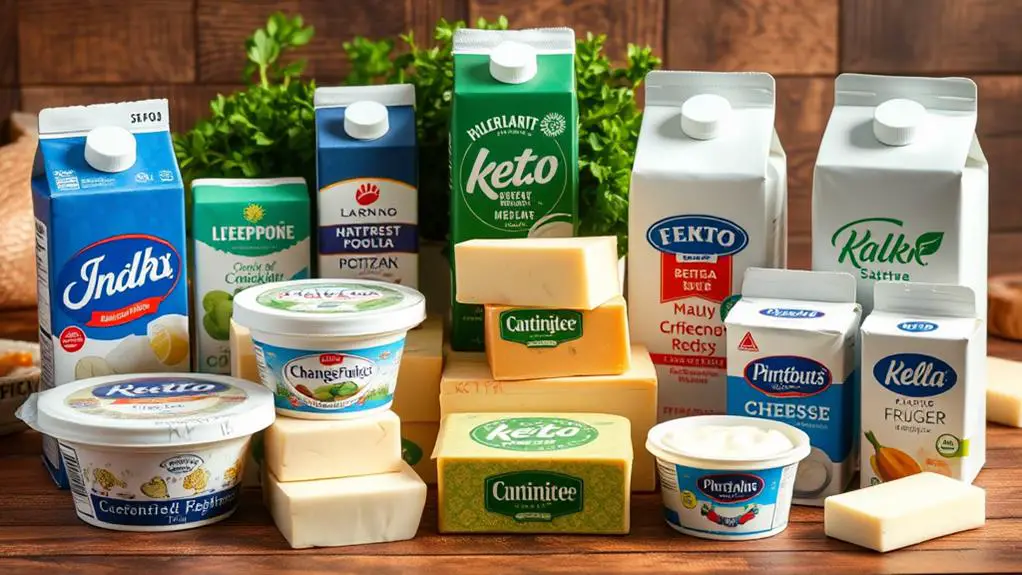
Maneuvering the world of keto-friendly dairy can be made simpler with the right brands.
Looking for keto cheese that won't break your carb bank? Horizon Organic Mild Cheddar Sticks are a lifesaver, with less than 1 gram of carbs per stick! Perfect for snacking anytime, anywhere.
Horizon also offers Mozzarella String Cheese, packing only 2 grams of carbs per snack, making it a convenient, on-the-go option.
Do you crave something creamy? Good Culture Organic Whole Milk Classic Cottage Cheese is your answer with just 3 grams of carbs per cup.
It's an excellent way to add protein while keeping your carb count low. For those who love ricotta, Organic Valley Whole Milk Ricotta Cheese delivers rich, creamy goodness at only 3 grams of carbs per ¼ cup.
It's ideal for whipping up delicious keto-friendly recipes.
If you're after a plant-based option, Kite Hill Almond Milk Ricotta is worth a try.
With 5 grams of carbs per ¼ cup, it fits perfectly into a low-carb diet while offering a dairy-free alternative.
Dairy-Free Options
Maneuvering a keto diet can be challenging, especially when seeking dairy-free options that align with low-carb requirements. Fortunately, there are several plant-based alternatives that fit the bill. Unsweetened almond milk is a popular choice, containing just 1 gram of net carbs per cup. This nut milk benefits those looking for a low-carb, dairy-free option. Similarly, macadamia nut milk offers 0 grams of net carbs per cup and is rich in heart-healthy monounsaturated fats.
For those needing a protein boost, unsweetened soy milk provides about 3 grams of net carbs per cup. It's vital to choose unsweetened varieties to avoid hidden sugars. Coconut milk is another versatile option, though its carb content can vary from 1 to 6 grams per cup, so checking labels is important.
In addition to these milks, plant-based yogurts made from almond, coconut, or soy can serve as dairy-free alternatives. Just confirm they have low carb counts and no added sugars to stay keto-friendly.
| Dairy-Free Milk | Net Carbs (per cup) |
|---|---|
| Unsweetened Almond Milk | 1 gram |
| Macadamia Nut Milk | 0 grams |
| Unsweetened Soy Milk | 3 grams |
| Unsweetened Coconut Milk | 1-6 grams |
Choosing the right plant-based alternatives can make a dairy-free keto diet both enjoyable and effective.
Frequently Asked Questions
What Dairy Is Allowed on Keto?
On a keto diet, permissible dairy includes keto cheese options like Parmesan, Swiss, Brie, and mascarpone. Additionally, low carb yogurt such as plain Greek yogurt and controlled portions of cottage cheese are acceptable due to their minimal carbohydrate content.
What Forms of Dairy Are Not Keto Friendly?
Ice cream, flavored milks, sweetened yogurts, and sugary puddings are not keto-friendly due to high sugar and carb content. Additionally, soft cheeses with higher lactose levels can pose issues for those with lactose intolerance seeking dairy alternatives.
Can You Have Too Much Dairy on Keto?
Excessive dairy consumption on a keto diet can hinder weight loss, disrupt ketosis, and cause gastrointestinal issues. Adhering to keto guidelines by moderating dairy intake is essential for maintaining ketosis and achieving desired health outcomes.
Can I Drink Milk on Keto?
Regular cow's milk is generally unsuitable for a keto diet due to its high lactose content. However, several milk alternatives like unsweetened almond, macadamia nut, and flax milk provide low-carb options suitable for those with lactose intolerance.
Conclusion
In summary, understanding the role of dairy in a keto diet is essential for achieving and maintaining ketosis. Selecting the right types of dairy, such as high-fat options, while avoiding high-carb varieties, can greatly impact dietary success. The benefits and drawbacks of dairy must be weighed carefully, considering individual health goals and preferences. Additionally, keto-friendly brands and dairy-free alternatives provide valuable options for those with specific dietary needs or lactose intolerance.

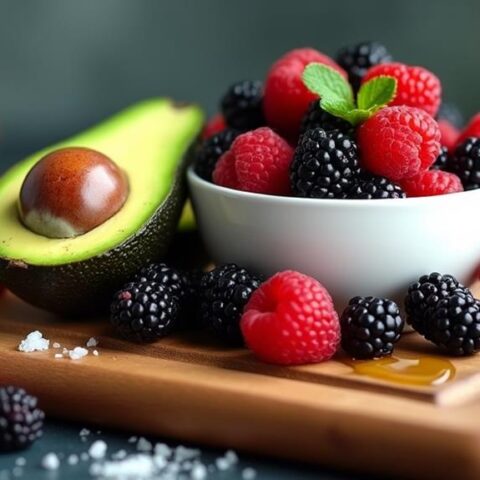
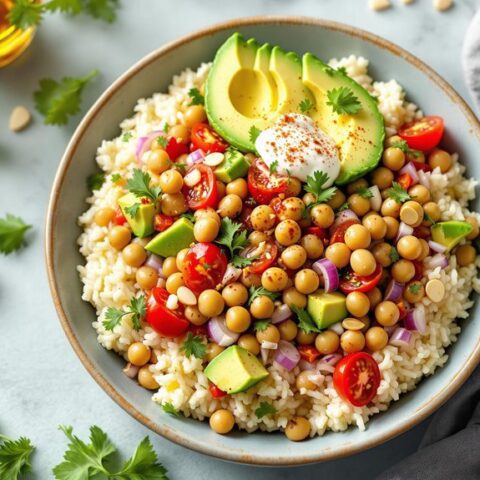
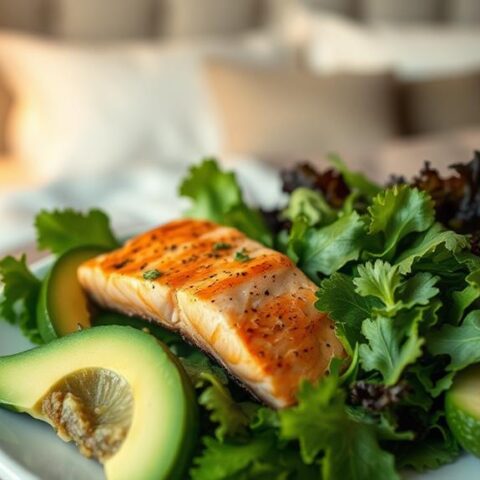

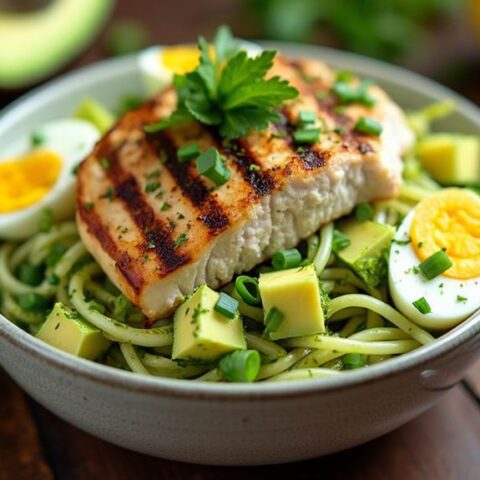




No Comments